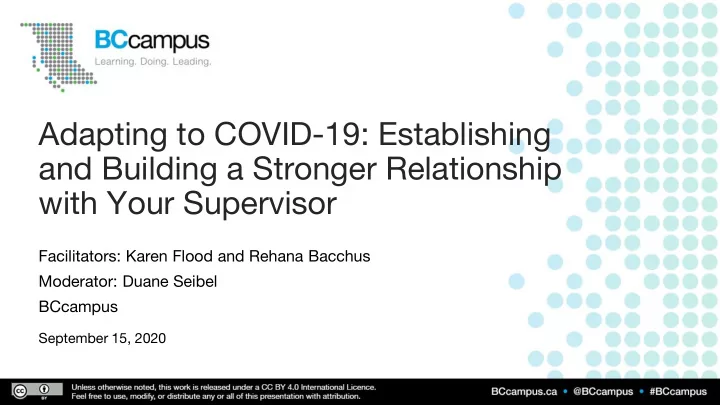

Adapting to COVID-19: Establishing and Building a Stronger Relationship with Your Supervisor Facilitators: Karen Flood and Rehana Bacchus Moderator: Duane Seibel BCcampus September 15, 2020
Territorial Acknowledgement We would like to acknowledge that although we are online and not physically on our campus, we are employees of UBC Vancouver, and that it is situated on the traditional, ancestral, and unceded territory of the Musqueam people. We would also like to acknowledge that you are joining us today from many places, near and far, and acknowledge the traditional owners and caretakers of those lands.
Session Pla lan Overview of principles of effective supervision • Building a strong relationship with your supervisor • Taking responsibility for your graduate program • Strategies for addressing and managing conflict •
Over 82% of graduate students report overall satisfaction with their supervisor but we recognize many also seek more consistent, meaningful interactions.
Supervision: Is a process of interactive, reciprocal, intellectual, and ethical • dialogue; Involves engagement with a community or communities of • scholars; Supports the development of professional judgement and learning • to create, transform, and share knowledge; Changes within and across units and disciplines, which are • constantly evolving and shifting; and Ideally inspires lifelong learning and commitment to the public • good.
UBC’s Seven Principles of Excellent Graduate Supervision Students’ learning benefits from individualized supervisory approaches 1. Student learning develops with both dialogue and guidance 2. Students’ multifaceted growth as scholars is supported by supervisors 3. Students learn from role models 4. Communication is key to teaching and learning and relationship-building 5. Scholarly and other communities are central to students’ development 6. Reflection makes one a better supervisor (and student!) 7.
Tell us what you think… What is one thing reflected in these principles you would most like to see in your relationship with your supervisor?
Pra ractices fo for eff ffective su supervisory re rela lationships: Thoughtful decision-making in deciding to work together • Communicating expectations • Mutual fostering of academic progress • Access to others/larger scholarly community • Maintaining appropriate boundaries • Proactively addressing issues/conflicts •
In In an id ideal worl rld, yo you and yo your su supervisor: • Are mutually committed to the success of your program; • Are a good fit in terms of research interests; • Are a good match of working style/willingness to adapt; • Create a timeline of productive meetings, goals, outcomes; • Establish clarity related to funding issues; and • Agree on available and suitable committee members.
Build ilding a st strong re rela lationship with ith yo your su supervisor: • Prioritize strong communication • Be your own project manager • Clarify existing and future financial support • Initiate or participate in discussions about intellectual property, publishing, and authorship • Seek advice, support, and conversation on academic matters • Contribute to a safe and stimulating environment • Negotiate conflicts, tensions, and issues that arise • Clarify expectations
Exp xpectations Discussion of expectations can foster open communication • between you and your supervisors This can help to prevent misunderstandings that might otherwise • arise, and be critical to the success of your program Having different expectations is a frequent cause of • misunderstandings, therefore it is important to communicate expectations to clarify and modify together, meet expectations (on both sides), and maintain ongoing communication in regards to any changes. Examples: UBC: https://www.grad.ubc.ca/current-students/supervision-advising McG cGill: https://www.mcgill.ca/gradsupervision/supervisors/roles-and-responsibilities/expectations
Take five… Reflecting on your expectations for your supervisor/supervision at the beginning of your program, how (and if) did you communicate your expectations to your supervisor?
Take five… Reflecting on your understanding of your supervisor’s expectations of you, how (and if) did they communicate them to you?
Addressin ing con onfli lict: The #1 reason the graduate supervision experience gets derailed: la lack of f communic icati tion mism ismatc tched expectati tions Differing expectations regarding responsibilities was identified by both students and supervisors as a major cause for conflict between graduate students and their supervisors
Examples of f potential conflict: Su Supervisor Expecta tati tions St Student t Exp xpecta tati tions Critical approach to literature review and Inappropriate to criticize experts, already well-developed and analytical reliance on inference and paraphrasing writing skills what ‘experts’ say without citations Solid research skills Training to improve research skills High level of autonomy Guidance initiated by supervisor Confidence with data collection and Supervisor will provide feedback and presentations confidence ahead of presentation
Tip Tips for for effe ffective problem re resolution: Problem solving Define the problem • Gather information • Define the goal • Generate solutions • Evaluate ideas and choose one • Implement and evaluation •
Tip Tips for for effe ffective problem re resolution (c (continued): Communication! Have confident conversations • Set boundaries • Know how to make requests •
The Sandwic ich Techniq ique Validation Message Action
Tips for Tip for effe ffective problem re resolution (c (continued): If the conflict continues to escalate, here are some practical tips to pursue problem resolution: Consult early, involve a neutral party • Document all interactions, timelines, and requests (especially decisions!) • Keep core principles in mind: fairness, academic progress and success, • academic integrity Know the policies in your program, graduate school and University •
Things to to avo void: • Fatigue • Isolation • Avoidance Ignoring or waiting too long to address “danger signals” of • supervisor and of self Withdrawal • • Judging and blaming others • The Karpman Drama Triangle: Being the victim (the only owner of legitimate feelings) • Being the rescuer (the one who always saves the day) • Being the persecutor •
Resources Graduate school contacts • Graduate student society (e.g., peer support) • Ombuds Office or Student Advocate • Equity Office • Institutional health and wellbeing resources • Here2Talk • Here to Help, Kelty’s Key • Crisis Centre (https://crisiscentre.bc.ca/) •
Thank you! https://covid19.bccampus.ca/category/webinars/ https://bccampus.ca/subscribe/
Recommend
More recommend